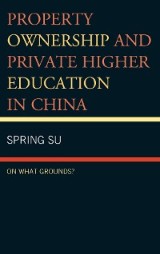Details

Property Ownership and Private Higher Education in China
On What Grounds?Emerging Perspectives on Education in China
|
104,99 € |
|
| Verlag: | Lexington Books |
| Format: | EPUB |
| Veröffentl.: | 13.05.2011 |
| ISBN/EAN: | 9780739143810 |
| Sprache: | englisch |
| Anzahl Seiten: | 214 |
DRM-geschütztes eBook, Sie benötigen z.B. Adobe Digital Editions und eine Adobe ID zum Lesen.
Beschreibungen
Recent decades have witnessed the proliferation in China of huge numbers of private universities and colleges in response to a wide-ranging spectrum of socio-economic and political demands under the country's flourishing market economy and its wholesale pursuit of decentralization. This book explores the issue of property ownership, an area which is regarded as an essential element in the attraction into the sector of local private institutions and foreign partnerships, as well as in facilitating the future development of the country's existing institutions. The focus throughout this book is primarily on the legal, economic, managerial and financial aspects of the relevant issues, as well as other related topics, such as consumer protections and fund-raising activities. A feasibility analysis and discussion is also provided on 'for-profit' universities and their potential market niches in China, in recognition of the fact that the current regulations-which allow private universities to maintain a non-profit status whilst actually enjoying profit returns-clearly provides some legitimacy to the phenomenon of 'for-profit in disguise.' It is argued in this book that such quasi-profit regulations may further exacerbate profiteering behavior, whilst it is also noted that, in the short term, there is a clear need to provide adequate protections within the apparent hybrid version of an ownership system-a system characterized by a mix of capitalism and socialism-through the adoption of a definitive legal framework within which economic actors can coordinate their efforts through a mutually understood framework of action. Finally, it is clear that in the transition from the 'rule-of-the-people' to the 'rule-of-law,' legislation, practices and compliance do not always go hand-in-hand in China; thus the healthy development of the educational sector will undoubtedly require some time, as well as the introduction of complementary mechanisms, for such legislation to be fully enforced in practice. This book concludes with policy recommendations on the existing property ownership system in China to address both the profitability and altruistic concerns of private institutions, and provides suggestions for areas which might be explored to facilitate ongoing sector development.
This book provides a comparative analysis of property ownership system and current quasi-profit regulations for the private higher education market in China, by constructing a theoretical model developed from institutional economics, mainstream privatization theories, and the relevant practices in use in Japan and the U.S. The book, which is written from historical, social, legal, economic and political perspectives, incorporates practical insights from in-depth case studies on various types/localities of private universities and colleges in China, including foreign invested colleges.
Chapter 1 Introduction
<br>Chapter 2 Chapter 1. Private Higher Education Development in China
<br>Chapter 3 Chapter 2. Literature Review: Property Ownership, Property
<br>Chapter 4 Chapter 3. Comparative Analysis of Non-profit and For-profit Private Higher Education
<br>Chapter 5 Chapter 4. Individual Case Studies of Property Ownership Systems of Private Higher Education Institutions in China
<br>Chapter 6 Chapter 5. Comparisons of the Case Studies
<br>Chapter 7 Chapter 6. Case Studies of Different Types of Private Higher Education Institutions in China
<br>Chapter 8 Chapter 7. Conclusions and Recommendations
<br>Chapter 2 Chapter 1. Private Higher Education Development in China
<br>Chapter 3 Chapter 2. Literature Review: Property Ownership, Property
<br>Chapter 4 Chapter 3. Comparative Analysis of Non-profit and For-profit Private Higher Education
<br>Chapter 5 Chapter 4. Individual Case Studies of Property Ownership Systems of Private Higher Education Institutions in China
<br>Chapter 6 Chapter 5. Comparisons of the Case Studies
<br>Chapter 7 Chapter 6. Case Studies of Different Types of Private Higher Education Institutions in China
<br>Chapter 8 Chapter 7. Conclusions and Recommendations
Spring Su is a research fellow at the Wah Ching Center of Research on Education in China at the University of Hong Kong.
Diese Produkte könnten Sie auch interessieren:

Novellierung der Immobilienwertermittlungsverordnung: Die neue Rechtsnorm des Immobilienmarkts in Deutschland

von: Martin Woltemate

24,99 €















